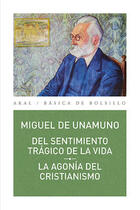With "Del sentimiento trágico de la vida" (1913) and "La agonía del cristianismo" (1925), Unamuno reveals himself to us as one of the greatest thinkers of our time. In these radically philosophical texts, placing the concrete man at the center of his research, Don Miguel comes to prefigure – announcing it – the whole philosophy of later existentialism. An illuminating preliminary study by Antonio Sánchez Barbudo comes to situate and shed new light on the philosophical and religious thinker Unamuno. The personal contradictions and paradoxes that emerged in his thought acted to prevent the development of a coherent system, so he had to resort to literature, as an expression of intimacy, to resolve some aspects of the reality of his ego. That personal anguish and his basic idea of understanding man as an "entity of flesh and blood", and life as an end in itself are projected in these two...read more
Shopping cart
Loading cart
Important notices
|
|
Revista Filosofía & Co. nº 9 Nueva revista de filosofia divulgativa y actualidad |
|
|
"Espacios de la filosofía" - Mauricio Beuchot - Novedad Herder México |
|
|
Revista Filosofía & Co. nº 8 Nueva revista de filosofia divulgativa y actualidad |
|
|
Hechos de tiempo Novedad Herder |
|
|
Revista Filosofía & Co. nº 7 Nueva revista de filosofia divulgativa y actualidad |
Pay safely with:


In the webshop
New
|
|
Lo impensado 68035 $470.00 -0.00% $470.00 |
|
|
Los sueños de diez noches 67963 $280.00 -0.00% $280.00 |
|
|
El Ojo - Cerebro 68199 $600.00 -20.00% $480.00 |
|
|
Arte y cosmotécnica 68201 $450.00 -0.00% $450.00 |
|
|
Materiales para una pesadilla 68203 $430.00 -0.00% $430.00 |
In the press
Promotions
|
|
Gadamer. Una Biografía 20442 $1,200.00 -50.00% $600.00 |
|
|
Los Caminos de Heidegger 20104 $1,200.00 -50.00% $600.00 |
|
|
¿Qué es el psicoanálisis 20804 $1,065.00 -50.00% $532.50 |
|
|
Lo esencial es invisible 20625 $840.00 -50.00% $420.00 |
|
|
Las rupturas del 68 en el cine de América Latina 67860 $660.00 -35.00% $429.00 |








